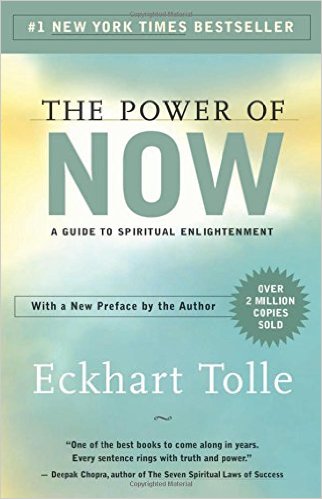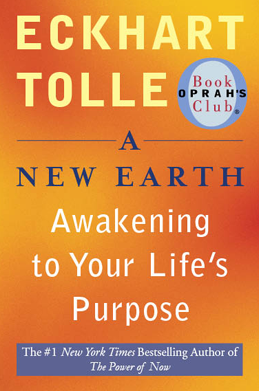|
Word Gems
exploring self-realization, sacred personhood, and full humanity
The essential impotence and weakness of Evil
return to the previous page
I puzzled about this one for years.
I marvelled, but without understanding, at the beauty of expression, and wisdom - for me, just out of reach - of certain teachers:
A Course In Miracles, Lesson 62: "Remember that in every attack you call upon your own weakness..."
Eric Hoffer, The Passionate State of Mind: "The lust for power is not rooted in strength but in weakness... When the weak want to give an impression of strength they hint menacingly at their capacity for evil. It is by its promise of a sense of power that evil often attracts the weak."
Rollo May, Power and Innocence: "Deeds of violence in our society are performed largely by those trying to establish their self-esteem, to defend their self-image, and to demonstrate that they, too, are significant... Violence arises not out of superfluity of power, but out of powerlessness."
Fr. O'Flaherty to Kappler, The Scarlet And The Black: "When it comes down to it, a bullet is the only argument you’ve got."
Leo Rosten: "I learned that it is the weak who are cruel, and that gentleness is to be expected only from the strong."
Rainer Maria Rilke: “Everything terrible is something that needs our love.”
How could this be so? We are accustomed to the bluster and threats of Evil, which often actualize as violence. Is this not a form of power?
But many of the great thinkers are not impressed with this meretricious display of animal spirits. They say that Evil's power is a paper tiger and constitutes nothing more than showmanship, a vulgar illusion:
Carl Jung: The man who promises everything is sure to fulfill nothing, and everyone who promises too much is in danger of using evil means in order to carry out his promises, and is already on the road to perdition.
Charles Caleb Colton: There is this of good in real evils: they deliver us, while they last, from the petty despotism of all that were imaginary.
Glen Bateman, The Stand: And all this time we were afraid of you! We thought you were really something! But you’re nothing more than that little roach doing your little roach-errands!
Dorothe Deluzy: We believe at once in evil, we only believe in good upon reflection. Is this not sad?
John Steinbeck: It has always seemed strange to me...The things we admire in men, kindness and generosity, openness, honesty, understanding and feeling, are the concomitants of failure in our system. And those traits we detest, sharpness, greed, acquisitiveness, meanness, egotism and self-interest, are the traits of success. And while men admire the quality of the first they love the produce of the second.
Frances de Sales: "Nothing is so strong as gentleness. Nothing is so gentle as real strength."
Eckhart Tolle: "Power over others is weakness disguised a strength."
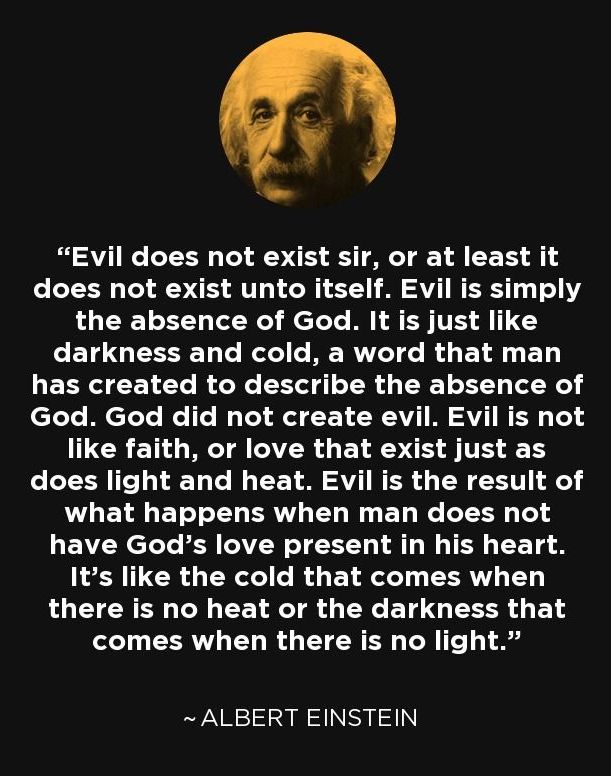
Evil may be a paper tiger, but, even so, we all know that it has taken the lives of countless millions in this world. What are these thinkers talking about?
The poet Rilke once said that, if we are patient, if we cherish and tend to our questions like delicate seedlings, one day we might "grow into" the answers.
I'm able to see two possible answers to the question of Evil's intrinsic weakness:
(1) Evil, in terms of violating the rights of others, is merely a mask for a perpetrator's neediness and fears of "not having enough," which is part of the larger pathology of viewing oneself as "not being enough."
(2) Evil cannot give us what we really want - the deep desires of the inner person, the soul.
Evil, for all of its false bravado and show-of-force, cannot give us what we really and truly want in life. Evil can kill the body; but death, too, is an illusion - nothing can rob us of the true Life.
People are seduced into employing Evil in an attempt to fill the neediness clamoring within. But, even if Evil were to deliver all the material riches of the entire world, none of it would heal that hole in one's heart.
Ayn Rand: "Why do they always teach us that it's easy and evil to do what we want and that we need discipline to restrain ourselves? It's the hardest thing in the world to do what we want. And it takes the greatest kind of courage. I mean, what we really want.”
What every person truly wants is to receive and to give intimate love. The gifts of love - romantic and agape - are spiritual in nature; and Evil is utterly impotent to offer any comfort in that regard.
All Evil can do, at its worst, is to kill the mortal body; and that's not very much.
the spiritually immature are impressed with the seeming power, the quick results, of violence, of evil
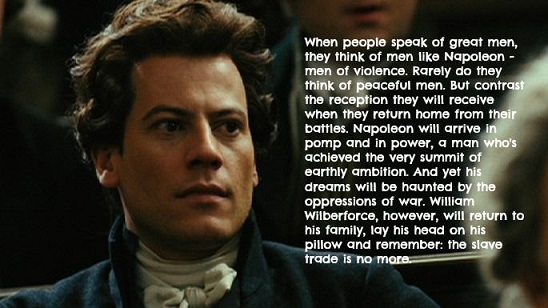
|
In 1787, a young Englishman, William Wilberforce, became aware of the atrocities of the African slave trade. So moved was he that, against all odds, against powerful political and economic interests, often working alone, he began to wage war on this barbarity. Very slowly, by inches, as prosecuting attorney for the truth, he would turn public opinion against the great inhumanism. Finally, after decades of crusade, during which he was constantly attacked, threatened, and vilified by the privileged, Parliament set as law The Slavery Abolition Act of 1833 throughout the entire British Empire. Wilberforce's struggle was not unique: every reformer, as guardian of sacred freedoms and human dignity, intent upon overturning the vested totalitarian interests, the "money-changers' tables," will face kangaroo-court treatment in this world. See William Wilberforce in the motion picture, Amazing Grace, and read more on the "Economics" page.
|
|
Eckhart Tolle, The New Earth
what looks like weakness is the only true strength
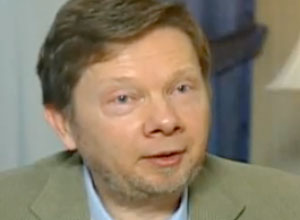
"Instead of trying to be the mountain, teaches the ancient Tao Te Ching, 'Be the valley of the universe.' In this way you are restored to wholeness and so 'All things will come to you'."
The ego is always on guard against any kind of perceived diminishment. Automatic ego-repair mechanisms come into effect to restore the mental form of “me.” When someone blames or criticizes me, that to the ego is a diminishment of self, and it will immediately attempt to repair its diminished sense of self through self-justification, defense, or blaming.
Whether the other person is right or wrong is irrelevant to the ego. It is much more interested in self-preservation than in the truth. This is the preservation of the psychological form of “me.” Even such a normal thing as shouting something back when another driver calls you “idiot” is an automatic and unconscious ego-repair mechanism.
anger as ego-repair mechanism
One of the most common ego-repair mechanisms is anger, which causes a temporary but huge ego-inflation. All repair mechanisms make perfect sense to the ego but are actually dysfunctional. Those that are most extreme in their dysfunction are physical violence and self-delusion in the form of grandiose fantasies.
A powerful spiritual practice is consciously to allow the diminishment of ego when it happens without attempting to restore it. I recommend that you experiment with this from time to time.
don't fight it, just feel what it's like to be 'diminished'
For example, when someone criticizes you, blames you, or calls you names, instead of immediately retaliating or defending yourself – do nothing. Allow the self-image to remain diminished and become alert to what that feels like deep inside you. For a few seconds, it may feel uncomfortable, as if you had shrunk in size.
perceive a sense of 'space' around the bad feeling, which instructs that you and the bad feeling are two different things
Then you may sense an inner spaciousness that feels intensely alive. You haven't been diminished at all. In fact, you have expanded. You may then come to an amazing realization: When you are seemingly diminished in some way and remain in absolute non-reaction, not just externally but also internally, you realize that nothing real has been diminished, that through becoming “less,” you become more.
'space' around the bad feeling helps one to perceive that 'Being', the true self, is separate from the ego, the false self
When you no longer defend or attempt to strengthen the form of yourself, you step out of identification with form, with mental selfimage. Through becoming less (in the ego's perception), you in fact undergo an expansion and make room for Being to come forward. True power, who you are beyond form, can then shine through the apparently weakened form. This is what Jesus means when he says, “Deny yourself” or “Turn the other cheek.”
This does not mean, of course, that you invite abuse or turn yourself into a victim of unconscious people. Sometimes a situation may demand that you tell someone to “back off” in no uncertain terms. Without egoic defensiveness, there will be power behind your words, yet no reactive force. If necessary, you can also say no to someone firmly and clearly, and it will be what I call a “high-quality no” that is free of all negativity.
the great Spirit Guides speak of God's apparent weakness as strength
If you are content with being nobody in particular, content not to stand out, you align yourself with the power of the universe. What looks like weakness to the ego is in fact the only true strength. This spiritual truth is diametrically opposed to the values of our contemporary culture and the way it conditions people to behave.
Instead of trying to be the mountain, teaches the ancient Tao Te Ching, “Be the valley of the universe.” In this way you are restored to wholeness and so “All things will come to you.”
Similarly, Jesus, in one of his parables, teaches that
“When you are invited, go and sit in the lowest place so that when your host comes, he may say to you, friend, move up higher. Then you will be honored in the presence of all who sit at table with you. For everyone who exalts himself will be humbled, and he who humbles himself will be exalted.”
be content as 'nobody' until your own burgeoning competence unavoidably elevates you
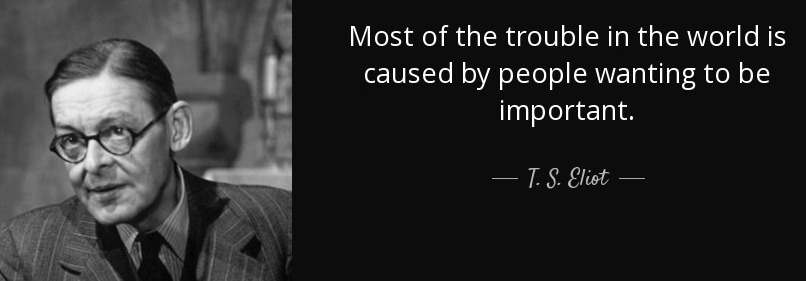
Another aspect of this practice is to refrain from attempting to strengthen the self by showing off, wanting to stand out, be special, make an impression, or demand attention. It may include occasionally refraining from expressing your opinion when everybody is expressing his or hers, and seeing what that feels like.
|
|




